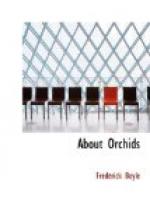The ground at my disposal is a quarter of an acre. From that tiny area deduct the space occupied by my house, and it will be seen that myriads of good people dwelling in the suburbs, whose garden, to put it courteously, is not sung by poets, have as much land as I. The aspect is due north—a grave disadvantage. Upon that side, from the house-wall to the fence, I have forty-five feet, on the east fifty feet, on the south sixty feet, on the west a mere ruelle. Almost every one who works out these figures will laugh, and the remainder sneer. Here’s a garden to write about! That area might do for a tennis-court or for a general meeting of Mr. Frederic Harrison’s persuasion. You might kennel a pack of hounds there, or beat a carpet, or assemble those members of the cultured class who admire Mr. Gladstone. But grow flowers—roses—to cut by the basketful, fruit to make jam for a jam-eating household the year round, mushrooms, tomatoes, water-lilies, orchids; those Indian jugglers who bring a mango-tree to perfection on your verandah in twenty minutes might be able to do it, but not a consistent Christian. Nevertheless I affirm that I have done all these things, and I shall even venture to make other demands upon the public credulity.
When I first surveyed my garden sixteen years ago, a big Cupressus stood before the front door, in a vast round bed one half of which would yield no flowers at all, and the other half only spindlings. This was encircled by a carriage-drive! A close row of limes, supported by more Cupressus, overhung the palings all round; a dense little shrubbery hid the back door; a weeping-ash, already tall and handsome, stood to eastward. Curiously green and snug was the scene under these conditions, rather like a forest glade; but if the space available be considered and allowance be made for the shadow of all those trees, any tiro can calculate the room left for grass and flowers—and the miserable appearance of both. Beyond that dense little shrubbery the soil was occupied with potatoes mostly, and a big enclosure for hens.
First I dug up the fine Cupressus. They told me such a big tree could not possibly “move;” but it did, and it now fills an out-of-the-way place as usefully as ornamentally. I suppressed the carriage-drive, making a straight path broad enough for pedestrians only, and cut down a number of the trees. The blessed sunlight recognized my garden once more. Then I rooted out the shrubbery; did away with the fowl-house, using its materials to build two little sheds against the back fence; dug up the potato-garden—made tabula rasa, in fact; dismissed my labourers, and considered. I meant to be my own gardener. But already, sixteen years ago, I had a dislike of stooping. To kneel was almost as wearisome. Therefore I adopted the system of raised beds—common enough. Returning home, however, after a year’s absence, I found my oak posts decaying—unseasoned, doubtless, when put in. To prevent trouble of




